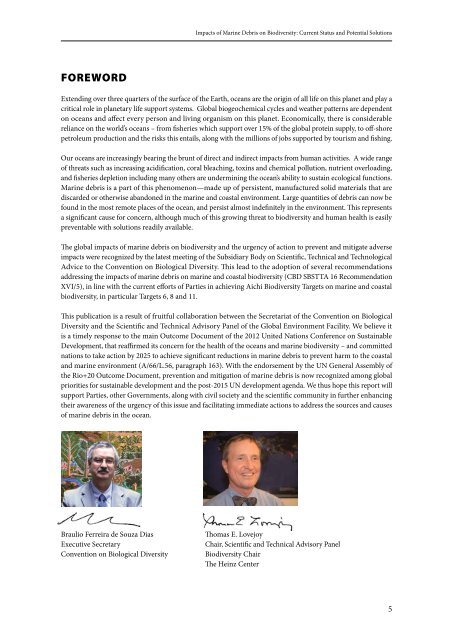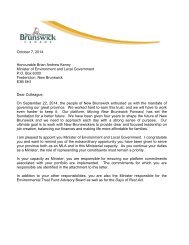cbd-ts-67-en
cbd-ts-67-en
cbd-ts-67-en
- No tags were found...
Create successful ePaper yourself
Turn your PDF publications into a flip-book with our unique Google optimized e-Paper software.
Foreword<br />
Impac<strong>ts</strong> of Marine Debris on Biodiversity: Curr<strong>en</strong>t Status and Pot<strong>en</strong>tial Solutions<br />
Ext<strong>en</strong>ding over three quarters of the surface of the Earth, oceans are the origin of all life on this planet and play a<br />
critical role in planetary life support systems. Global biogeochemical cycles and weather patterns are dep<strong>en</strong>d<strong>en</strong>t<br />
on oceans and affect every person and living organism on this planet. Economically, there is considerable<br />
reliance on the world’s oceans – from fisheries which support over 15% of the global protein supply, to off-shore<br />
petroleum production and the risks this <strong>en</strong>tails, along with the millions of jobs supported by tourism and fishing.<br />
Our oceans are increasingly bearing the brunt of direct and indirect impac<strong>ts</strong> from human activities. A wide range<br />
of threa<strong>ts</strong> such as increasing acidification, coral bleaching, toxins and chemical pollution, nutri<strong>en</strong>t overloading,<br />
and fisheries depletion including many others are undermining the ocean’s ability to sustain ecological functions.<br />
Marine debris is a part of this ph<strong>en</strong>om<strong>en</strong>on—made up of persist<strong>en</strong>t, manufactured solid materials that are<br />
discarded or otherwise abandoned in the marine and coastal <strong>en</strong>vironm<strong>en</strong>t. Large quantities of debris can now be<br />
found in the most remote places of the ocean, and persist almost indefinitely in the <strong>en</strong>vironm<strong>en</strong>t. This repres<strong>en</strong><strong>ts</strong><br />
a significant cause for concern, although much of this growing threat to biodiversity and human health is easily<br />
prev<strong>en</strong>table with solutions readily available.<br />
The global impac<strong>ts</strong> of marine debris on biodiversity and the urg<strong>en</strong>cy of action to prev<strong>en</strong>t and mitigate adverse<br />
impac<strong>ts</strong> were recognized by the latest meeting of the Subsidiary Body on Sci<strong>en</strong>tific, Technical and Technological<br />
Advice to the Conv<strong>en</strong>tion on Biological Diversity. This lead to the adoption of several recomm<strong>en</strong>dations<br />
addressing the impac<strong>ts</strong> of marine debris on marine and coastal biodiversity (CBD SBSTTA 16 Recomm<strong>en</strong>dation<br />
XVI/5), in line with the curr<strong>en</strong>t effor<strong>ts</strong> of Parties in achieving Aichi Biodiversity Targe<strong>ts</strong> on marine and coastal<br />
biodiversity, in particular Targe<strong>ts</strong> 6, 8 and 11.<br />
This publication is a result of fruitful collaboration betwe<strong>en</strong> the Secretariat of the Conv<strong>en</strong>tion on Biological<br />
Diversity and the Sci<strong>en</strong>tific and Technical Advisory Panel of the Global Environm<strong>en</strong>t Facility. We believe it<br />
is a timely response to the main Outcome Docum<strong>en</strong>t of the 2012 United Nations Confer<strong>en</strong>ce on Sustainable<br />
Developm<strong>en</strong>t, that reaffirmed i<strong>ts</strong> concern for the health of the oceans and marine biodiversity – and committed<br />
nations to take action by 2025 to achieve significant reductions in marine debris to prev<strong>en</strong>t harm to the coastal<br />
and marine <strong>en</strong>vironm<strong>en</strong>t (A/66/L.56, paragraph 163). With the <strong>en</strong>dorsem<strong>en</strong>t by the UN G<strong>en</strong>eral Assembly of<br />
the Rio+20 Outcome Docum<strong>en</strong>t, prev<strong>en</strong>tion and mitigation of marine debris is now recognized among global<br />
priorities for sustainable developm<strong>en</strong>t and the post-2015 UN developm<strong>en</strong>t ag<strong>en</strong>da. We thus hope this report will<br />
support Parties, other Governm<strong>en</strong><strong>ts</strong>, along with civil society and the sci<strong>en</strong>tific community in further <strong>en</strong>hancing<br />
their awar<strong>en</strong>ess of the urg<strong>en</strong>cy of this issue and facilitating immediate actions to address the sources and causes<br />
of marine debris in the ocean.<br />
Braulio Ferreira de Souza Dias<br />
Executive Secretary<br />
Conv<strong>en</strong>tion on Biological Diversity<br />
Thomas E. Lovejoy<br />
Chair, Sci<strong>en</strong>tific and Technical Advisory Panel<br />
Biodiversity Chair<br />
The Heinz C<strong>en</strong>ter<br />
5



